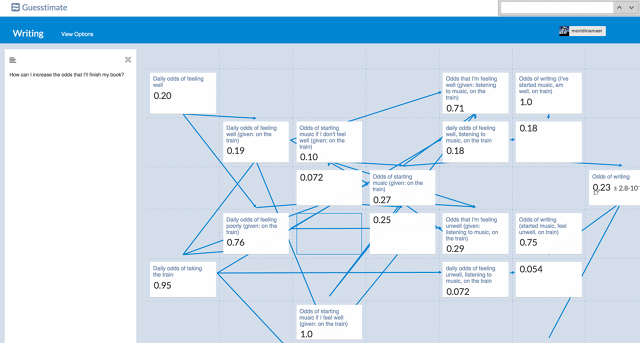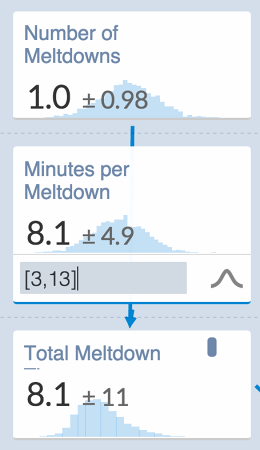Spreadsheets are absolute. You enter some variables, and a spreadsheet outputs an absolute number, according to whatever logic has been programmed into it. But here's the problem: While spreadsheets like Excel are tools of certainty, we use them to manage uncertain things, like our stock portfolios, our home finances, and so on. Things where there's no right answer, just a range of probable best answers.

Guesstimate is a new kind of spreadsheet created by software engineer Ozzie Gooen. It doesn't try to be absolute. Instead, it's a spreadsheet designed from the ground-up to take uncertainty into account, allowing you to easily create spreadsheets that can tell you everything from the best times to sell your stock options, to how long it's going to take to get your screaming toddler ready for preschool.
Say you want to run some calculations on the projected sales of a new product in order to forecast your profit over three months. In Excel or Google Sheets, you'd start by estimating how many units you think you'd sell: say, 1,000 units. Then you'd run calculations from there. The problem is, that 1,000 unit estimate you're basing the rest of your spreadsheet on is just a guess. You could just as easily sell 900 units, in which case, your whole budget is wrong.

With Guesstimate, you don't have to make a hard guess on exactly how many units you'd sell. Instead, you enter a range of units you expect to sell, like '[500,1500]'. Then all the math that is done on this cell will be based on the full range. "If you use this to calculate your expected profit, you'll see its range as well, not with some arbitrary definition of a 'worst case', but with the actual lowest 1% and 5% percentiles," explains Gooen. "There's almost no extra work needed but you get a much better answer."
Why is this a big deal? Mainly, because when you use a spreadsheet to make predictions, the answers it spits out can be misleading—because they're based on hidden assumptions. "Popular spreadsheets encourage you to think in exact numbers, in averages instead of distributions," says Gooen. "It's really hard to indicate uncertainty. This can be fine when the data comes from historic tables, but often it's just gut judgements. And in a spreadsheet, your gut judgements will look exactly like real data."
Considering the caution many feel in the aftershocks of the Great Recession, Guesstimate seems like the way spreadsheets should work, but don't. We may never know if the last financial meltdown could have been lessened if just one made-up number in a Wall Street spreadsheet somewhere had been flagged as uncertain. But for the next one, thanks to spreadsheet software like Guesstimate, a single wrong assumption is much less likely to bring down the entire house of cards.